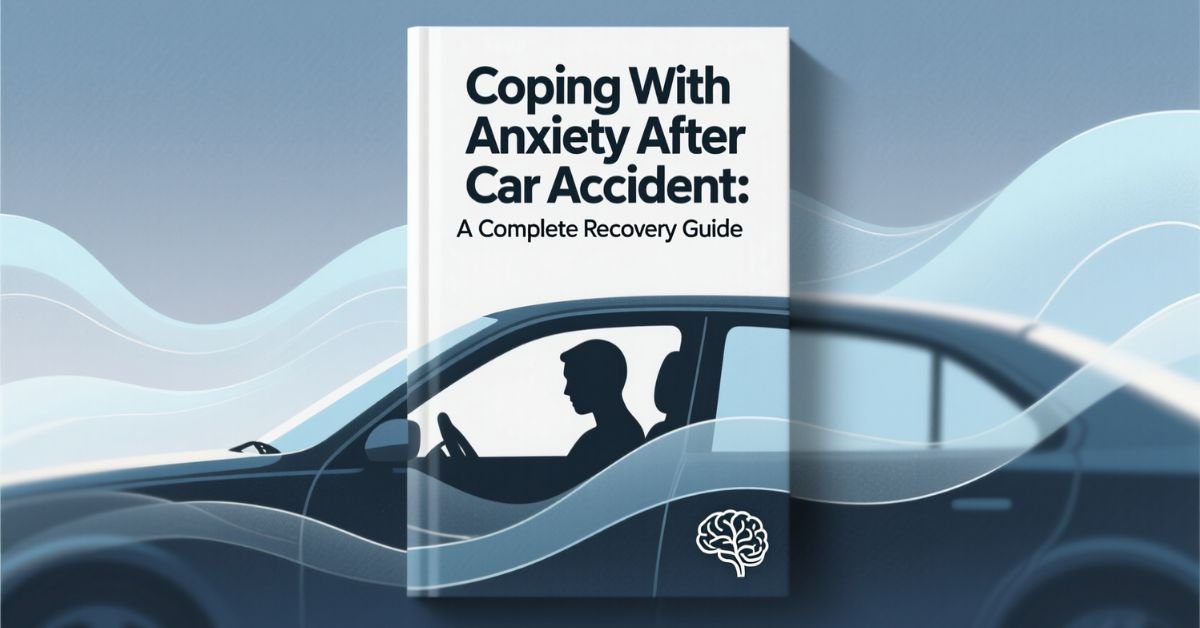Introduction
Anxiety after car accident is a common response to trauma. Many people feel nervous, restless, or overwhelmed after experiencing a crash. These emotions may appear as fear of driving, constant worrying, or even trouble sleeping. It is the body’s natural way of reacting to shock and stress.
However, sometimes these feelings do not fade with time. You might notice panic setting in each time you get into a car, or you may avoid driving altogether. Some people even relive the event in their minds, making it hard to move forward. If anxiety after car accident continues for weeks or gets worse, it can interfere with daily life and peace of mind. That’s when reaching out for support can make a real difference.
In this article, we will explore when anxiety after car accident becomes more than just a temporary reaction. You’ll learn the warning signs to watch for and understand when professional help is needed. With the right guidance and treatment, recovery is possible, and you can regain confidence on the road again.
Recognising Anxiety After a Road Crash
Anxiety after car accident can appear in many forms. Some people feel fear when thinking about driving again. Others may struggle with sleep or keep replaying the crash in their mind. It can also bring physical signs like a racing heartbeat, sweating, or shaking. These reactions are common, but when anxiety after car accident continues for weeks, it may need more attention.
Everyone feels anxiety after car accident differently. For some, it shows up as mild stress, while for others it becomes overwhelming. You may avoid driving, feel nervous as a passenger, or panic when hearing traffic noises. Recognising anxiety after car accident is the first step to recovery. Once you see the signs, you can begin to heal and rebuild confidence on the road.
What are Some Common Signs and Symptoms of Anxiety?
Anxiety after car accident can affect both the mind and body. You may feel constant worry, restlessness, or racing thoughts. Some people have trouble sleeping or find it hard to focus on daily tasks. Even small problems can feel bigger than they are when anxiety is strong.
The body can also show clear signs of anxiety. A fast heartbeat, sweating, shaking, or shortness of breath are very common. Some people feel stomach pain, headaches, or dizziness. These symptoms are the body’s way of showing stress. Recognising them early can help you take steps toward recovery.
Understanding the Psychological Shock After a Car Accident
A car accident can leave more than just physical injuries. Many people also feel psychological shock. The mind reacts to sudden trauma in this way. It may show up as fear, confusion, or numbness right after the crash. For some, these feelings last only a short time. For others, they stay longer and turn into anxiety after car accident.
Psychological shock can affect daily life in many ways. You may:
- Relive the accident through flashbacks or nightmares
- Feel jumpy or nervous when hearing traffic sounds
- Avoid driving or even sitting in a car
- Struggle with sleep, focus, or mood changes
These reactions are common. Understanding them is the first step to healing. With enough time, compassion, and support, healing is within reach
The Lingering Effects: Persistent Anxiety After a Car Accident
Anxiety after car accident does not always go away quickly. For some people, the fear stays for weeks or even months. This can affect driving, work, and daily life. Persistent anxiety after a car accident may feel overwhelming, but it is important to know that you are not alone. Many people face the same struggle, and help is available.
The lingering effects can appear in different ways. Some are emotional, while others are physical. Knowing these effects can make it easier to recognise the problem and take action. Below is a table showing common signs of persistent anxiety after a car accident.
| Category | Common Signs and Effects |
| Emotional | Constant fear of driving, mood swings, feeling helpless, sadness, irritability |
| Cognitive | Trouble concentrating, racing thoughts, flashbacks, overthinking small details |
| Behavioral | Avoiding cars, refusing to drive, skipping travel plans, avoiding accident-related discussions |
| Physical | Fast heartbeat, sweating, shaking, headaches, stomach pain, trouble sleeping |
Post-Traumatic Stress Disorder (PTSD) After a Car Accident
Sometimes, anxiety after car accident can develop into Post-Traumatic Stress Disorder (PTSD). This condition happens when the memory of the crash keeps returning in painful ways. A person may have flashbacks, nightmares, or feel intense fear when near cars or busy roads. PTSD creates a constant sense of danger, even when nothing harmful is present.
Experiencing PTSD after a car accident can influence both emotions and behavior. You may feel distant from others, lose interest in daily activities, or become easily upset. Some people avoid driving completely because of the fear. Recognising these signs early is important. With the right treatment, such as therapy and support, it is possible to manage PTSD and regain control of life.
When Should You Get Help for Anxiety?
Anxiety after car accident is normal, but it should not control your life. If fear or worry stays for weeks and does not improve, it may be time to get help. You should also seek support if anxiety stops you from driving, working, or enjoying daily activities.
Getting help is important when symptoms become too strong to handle alone. If you feel panic attacks, constant fear, or trouble sleeping every night, professional support can make a big difference. Talking to a doctor or therapist can give you the right tools to heal and feel safe again.
Treatment Options for Persistent Anxiety and Shock
Anxiety caused by a car accident can improve when treated effectively. Support from professionals, family, and friends plays a big role in recovery. Therapy, medication, and self-care can help reduce fear and bring back confidence. Healing takes time, but every small step makes progress possible.
Some common treatment options include:
- Therapy: Talking with a counselor or therapist helps process fear and trauma.
- Medication: Doctors may give medicine to ease strong anxiety or panic.
- Support groups: Sharing experiences with others who had accidents can reduce loneliness.
- Relaxation techniques: Deep breathing, meditation, or gentle exercise can calm the mind.
- Gradual exposure: Slowly returning to driving or riding in a car can rebuild trust and safety.
Moving Forward: Reclaiming Your Life After Trauma
Anxiety after car accident does not have to define your life. Healing takes patience, but it is possible to move forward. Small steps each day can help you rebuild strength and confidence. The goal is not to forget the accident, but to live freely without constant fear.
Recovery can look different for everyone. Some people find comfort in therapy, while others heal through support from loved ones. Lifestyle changes and coping skills also make a big difference. Below is a table with simple ways to reclaim your life after trauma.
| Area of Life | Steps to Rebuild Confidence |
| Emotional Health | Practice relaxation, keep a journal, attend therapy, talk about feelings openly |
| Physical Health | Exercise regularly, eat healthy meals, get enough sleep, avoid too much caffeine or alcohol |
| Social Life | Spend time with family, connect with supportive friends, join community or support groups |
| Driving Confidence | Start with short rides, drive with a trusted friend, practice on quiet roads, celebrate progress |
| Daily Routine | Create structure, set small goals, reward progress, focus on positive activities |
Conclusion
Anxiety after car accident can feel heavy, but it does not last forever. With the right care, support, and patience, healing is always possible. Taking small steps each day makes a big difference in recovery.
Remember, you are not alone in this journey. Many people have faced the same struggles and found their way forward. With time, you can rebuild confidence, feel safe again, and enjoy life without constant fear.
FAQs
1. Is anxiety after car accident normal?
Yes, it is a common reaction. Many people feel fear, stress, or worry after a crash.
2. How long does anxiety after car accident last?
It can last a few days to several weeks. If it continues for months, it may need professional help.
3. Can anxiety after car accident cause physical symptoms?
Yes, it can cause a fast heartbeat, sweating, shaking, headaches, or stomach problems.
4. What is the best way to cope with anxiety after car accident?
Therapy, relaxation techniques, support from loved ones, and gradual exposure to driving can help.
5. When should I see a doctor for anxiety after car accident?
If anxiety affects daily life, driving, sleep, or work, it is best to seek professional help.

